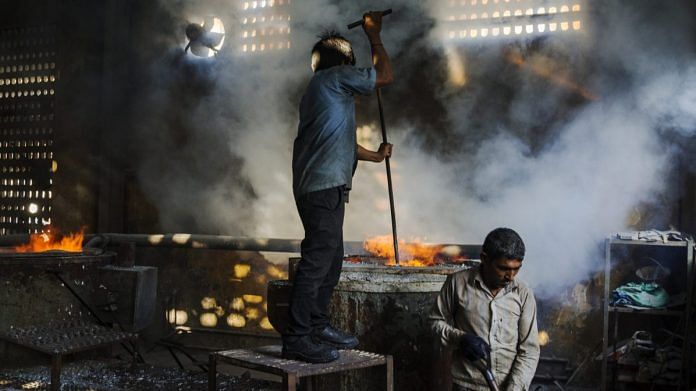New Delhi: Representatives of the Indian recycling industry have demanded a separate ministry to drive its growth and help convert the country’s waste into wealth.
Speaking to media persons Thursday, board members of the Material Recycling Association of India (MRAI) said leveraging recycling possibilities will not only help the Narendra Modi government achieve its $5 trillion economy but also generate millions of jobs.
“There are a number of policies on recycling that have been floated by different ministries. The Ministry of Steel, Ministry of Power, Ministry of Environment, Forests and Climate Change, and the Ministry of Mines have separate policies that were notified at different times but not in tandem with each other,” said Naveen Sharma, director, MRAI.
“It is also very difficult to get different ministries under one platform. The recycling industry is like a baby with no parents,” he added.
MRAI is a national association of recycling industries, with over 1,200 members. It has worked with the NITI Aayog to formulate a draft National Recycling Policy. But board members said this draft has been doing the rounds of multiple ministries for several months now.
Sharma also said the mining industry has a strong lobby and mandates passed by the mining ministry is often detrimental to the recycling sector.
“Recycling industry consumes less resources than mining, in terms of land as well as power consumed. It also has a much smaller carbon footprint, and less harmful byproducts,” Sharma said.
“For example when you mine an ore, only four-five per cent of it is useful metal — rest 95 per cent go in the dump. The energy requirement to produce the same amount of metal is huge. Recycling uses 1/20th of the energy for the same amount of metal,” he added.
Also read: Now, drink coffee without milk to cut your carbon footprint, Starbucks says
Policy for dry & wet waste segregation, courses on recycling
Apart from a separate ministry, the MRAI also highlighted the need for an effective policy for dry and wet segregation of waste at household level.
“The reason we have to import scrap today is because our raw materials are going to landfills,” said Amar Singh, secretary general of MRAI.
The body also recommended incorporating a course on recycling in school curricula so that children are made aware of different types of waste and the values of reusing.
Giving an example of the waste paper recycling industry, MRAI board member Navneet Chadha told how Indians have been reselling newspapers for decades. “We need similar models for other household items that can be recycled.”
Board members also said India needs to follow China’s example and establish “recycling zones” as well as “shredding centers” that can become hubs of scrap management.
Import duty on scrap metals should be removed
MRAI said the import duty levied on scrap metals should be removed to allow a level-playing field for the domestic recycling market.
“Importing metals from ASEAN (Association of Southeast Asian Nations) countries is duty free. These nations import scrap metal at zero duty. India levies the same duty of five per cent on finished metals as it does on scrap metals,” said Singh.
Sanjay Mehta, president of MRAI, said, “Recycling has the innate capacity to play the role of a catalyst to nation building if it is aligned to announced national priorities of the government like Swachh Bharat, Make in India, and development of smart cities.”
“Incorporating the salient aspects of a national recycling policy will lead to a zero-waste policy and regulate illegal dumping of end-of-life products, which in turn will lead to cleaner surroundings, especially around residential areas — all contributing to making the ‘clean India’ campaign more successful.” Mehta added.
Also read: What the e-waste industry has learnt from Star Wars’ economic model




Yes yes, we are suffering a lot due to high taxes and return policies,, so please consider this as an issue and make a way for recyclers of metals and scrap melting companies…